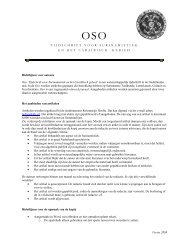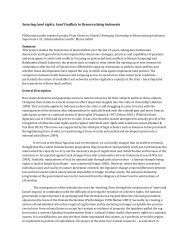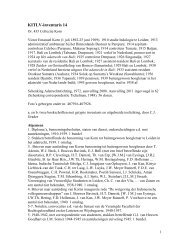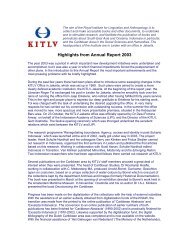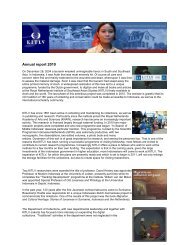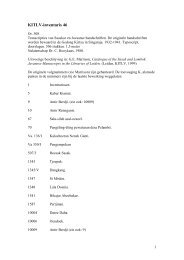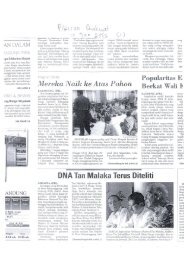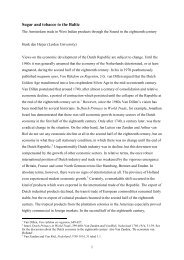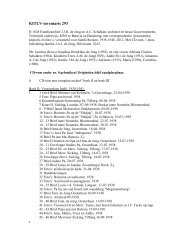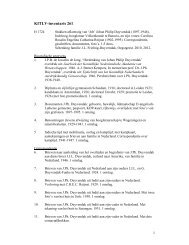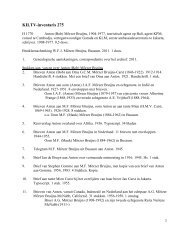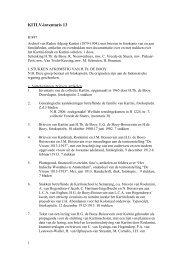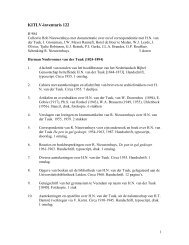indonesian economic decolonization in regional and ... - kitlv
indonesian economic decolonization in regional and ... - kitlv
indonesian economic decolonization in regional and ... - kitlv
Create successful ePaper yourself
Turn your PDF publications into a flip-book with our unique Google optimized e-Paper software.
Indonesian <strong>economic</strong> <strong>decolonization</strong> <strong>in</strong> <strong>regional</strong> <strong>and</strong> <strong>in</strong>ternational perspective 5<br />
Significantly, the concept of a ‘national economy’ was only shortly afterwards<br />
officially l<strong>in</strong>ked to Indonesian national identity. In his annual report about<br />
1959, the central bank president wrote: ‘An Indonesian economy can only be<br />
truly called “national” if based on the Indonesian spiritual <strong>and</strong> material identity’<br />
(Bank Indonesia 1960:2). Such a statement served as legitimization of the<br />
nationalization of Dutch firms only one year before, possibly also <strong>in</strong> defence<br />
of the far-reach<strong>in</strong>g discrim<strong>in</strong>atory measures taken aga<strong>in</strong>st ethnic Ch<strong>in</strong>ese<br />
merely months earlier.<br />
Nationalist sentiments were <strong>in</strong>creas<strong>in</strong>gly <strong>in</strong>term<strong>in</strong>gled with the political<br />
ideologies of the Cold War. There was traditionally a tendency among lead<strong>in</strong>g<br />
Indonesian economists to favour co-operatives <strong>and</strong> active participation<br />
by the state <strong>in</strong> <strong>economic</strong> life above unrestra<strong>in</strong>ed scope for private capital. The<br />
populace’s trust <strong>in</strong> private entrepreneurship was severely damaged when<br />
the Benteng programme became a public sc<strong>and</strong>al <strong>in</strong> the mid-1950s. The role<br />
of the state as a major player <strong>in</strong> the economy was greatly enhanced when<br />
the Dutch firms were formally nationalized <strong>and</strong> became the property of the<br />
Indonesian nation. This was re<strong>in</strong>forced by Sukarno’s <strong>in</strong>troduction of the doctr<strong>in</strong>es<br />
‘Guided Economy’ <strong>and</strong> ‘socialism à la Indonesia’ <strong>in</strong> 1958-1960, which<br />
met with strik<strong>in</strong>gly little dissent from lead<strong>in</strong>g Indonesian economists (Mackie<br />
1971:51). The <strong>economic</strong> system envisaged <strong>in</strong> the new nation-state <strong>in</strong> the late<br />
1950s <strong>and</strong> early 1960s was one <strong>in</strong> which the ‘people’s welfare’ was the core<br />
pr<strong>in</strong>ciple, an aim which, accord<strong>in</strong>g to accepted ideology at the time, was not<br />
to be achieved by the system of private capitalism that the one-time colonial<br />
masters had bequeathed to Indonesia (Robison 1986:37-8).<br />
A uniquely Indonesian feature of the nation-state <strong>in</strong> an entrepreneurial<br />
capacity was the heavy <strong>in</strong>volvement of the military <strong>in</strong> <strong>economic</strong> life. Different<br />
from previous writers, Bambang Purwanto traces the orig<strong>in</strong>s of military-controlled<br />
bus<strong>in</strong>ess right to the very beg<strong>in</strong>n<strong>in</strong>g of the Indonesian Revolution <strong>in</strong><br />
1945. He argues that the l<strong>in</strong>k between <strong>economic</strong> <strong>decolonization</strong> <strong>and</strong> <strong>in</strong>creas<strong>in</strong>g<br />
military bus<strong>in</strong>ess was established <strong>in</strong> the late 1940s <strong>and</strong> successively<br />
strengthened <strong>in</strong> the course of the 1950s. Decolonization placed the military<br />
<strong>in</strong> a key position that was re<strong>in</strong>forced by the apparent <strong>in</strong>ability of the civilian<br />
government to manage the nation’s <strong>economic</strong> resources. This nurtured the<br />
<strong>in</strong>terest of soldiers <strong>and</strong> officers <strong>in</strong> conduct<strong>in</strong>g bus<strong>in</strong>ess, both as a group <strong>and</strong><br />
as <strong>in</strong>dividuals. By the late 1950s, military officers had slotted themselves <strong>in</strong>to<br />
a dependence on bus<strong>in</strong>ess activities. They were reap<strong>in</strong>g large profits, not only<br />
<strong>economic</strong>ally, but also socially <strong>and</strong> politically. As an <strong>in</strong>stitution, the army <strong>in</strong><br />
particular grew dependent on f<strong>in</strong>ancial proceeds from its bus<strong>in</strong>ess deals. By<br />
the time that <strong>economic</strong> <strong>decolonization</strong> was near<strong>in</strong>g its end, conduct<strong>in</strong>g bus<strong>in</strong>ess<br />
<strong>and</strong> be<strong>in</strong>g <strong>in</strong> the military had become two sides of the same co<strong>in</strong>.




